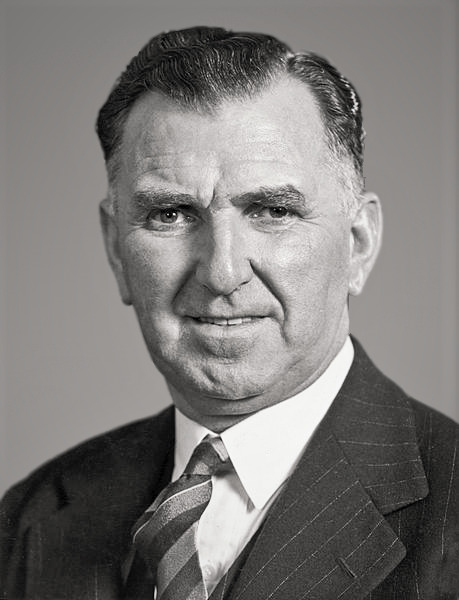Rt. Hon. S.G. Holland
Sir Sidney George Holland (18 October 1893 – 5 August 1961) was a New Zealand politician who served as the 25th prime minister of New Zealand from 13 December 1949 to 20 September 1957. He was instrumental in the creation and consolidation of the New Zealand National Party, which was to dominate New Zealand politics for much of the second half of the 20th century. Holland was elected to parliament in 1935, and became the second Leader of the National Party, and Leader of the Opposition, in 1940. He served briefly (1942) in a war cabinet but thereafter attacked the Labour government for its interventionist economic policies. Holland led the National Party to its first election victory in 1949. His National government implemented moderate economic reforms, dismantling many state controls. Holland's government also undertook constitutional change in 1950, by abolishing the Legislative Council, the upper house of parliament, on the grounds that it was ineffectual. In 1951, Holland, having confronted locked out dockers and coal miners intent on what he called "industrial anarchy", called a snap election and was re-elected Prime Minister. In its second term, the National government signed the ANZUS defence agreement with Australia and the United States. Holland led his party to a third consecutive victory in 1954. Following ill health in 1957, Holland stepped down as Prime Minister to be replaced by Keith Holyoake. (Wikipedia)
- name
- Family Name
- Given Name
- Birth Date
- Death Date
- Nationality
- Job Title
- Is Referenced By
- Description
- isRelatedTo
-
Rt. Hon. S.G. Holland
-
Holland
-
S.G.
-
1893
-
1961
-
New Zealander
-
Prime Minister of New Zealand
-
Sir Sidney George Holland (18 October 1893 – 5 August 1961) was a New Zealand politician who served as the 25th prime minister of New Zealand from 13 December 1949 to 20 September 1957. He was instrumental in the creation and consolidation of the New Zealand National Party, which was to dominate New Zealand politics for much of the second half of the 20th century. Holland was elected to parliament in 1935, and became the second Leader of the National Party, and Leader of the Opposition, in 1940. He served briefly (1942) in a war cabinet but thereafter attacked the Labour government for its interventionist economic policies. Holland led the National Party to its first election victory in 1949. His National government implemented moderate economic reforms, dismantling many state controls. Holland's government also undertook constitutional change in 1950, by abolishing the Legislative Council, the upper house of parliament, on the grounds that it was ineffectual. In 1951, Holland, having confronted locked out dockers and coal miners intent on what he called "industrial anarchy", called a snap election and was re-elected Prime Minister. In its second term, the National government signed the ANZUS defence agreement with Australia and the United States. Holland led his party to a third consecutive victory in 1954. Following ill health in 1957, Holland stepped down as Prime Minister to be replaced by Keith Holyoake. (Wikipedia)
Linked resources
| Title | Class |
|---|---|
| Long Live the Queen (Coronation Programme) | CreativeWork |

